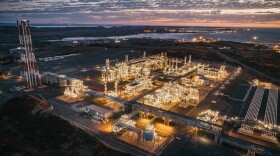-
A new study published in Nature Communications looked at what happens when climate change and toxic pollution intersect.
-
The NTSB says the leak in the pipeline off Louisiana was caused by underwater landslides that are caused by hazards such as hurricanes.
-
The Supreme Court will hear an appeal from Chevron, Exxon and other oil and gas companies that lawsuits seeking compensation for coastal land loss and environmental degradation in Louisiana should be heard in federal court.
-
An 83-year-old well is gushing a mixture of oil and gas into the coastal marshes of Plaquemines Parish. The United States Coast Guard ramped up efforts to contain it on Thursday.
-
An Australian fossil fuel company committed Tuesday to build a $17.5 billion liquefied natural gas export terminal in Louisiana, following up on plans first announced 10 years ago.
-
Fifteen years after the Deepwater Horizon disaster off the Gulf Coast, the effects of the largest oil spill in U.S. history are still being felt.
-
A leak – significant, yet small by Louisiana standards – has highlighted concerns about the state’s response to such leaks under the Trump administration and Gov. Jeff Landry.
-
In a legal setback for fossil fuel advocates, a federal court has invalidated a large offshore oil and gas lease sale in the Gulf of Mexico, ruling Thursday in favor of environmental groups that sued to block the lease after it was scheduled for auction in 2023.
-
The administration’s efforts to solve a so-called “energy emergency” might create an actual crisis.
-
Despite President Donald Trump’s calls to “drill, baby, drill,” many oil companies operating in the Gulf of Mexico will likely do what they’ve done for years: sit on hundreds of untapped oil leases across millions of acres.

Play Live Radio
Next Up:
0:00
0:00
Available On Air Stations









